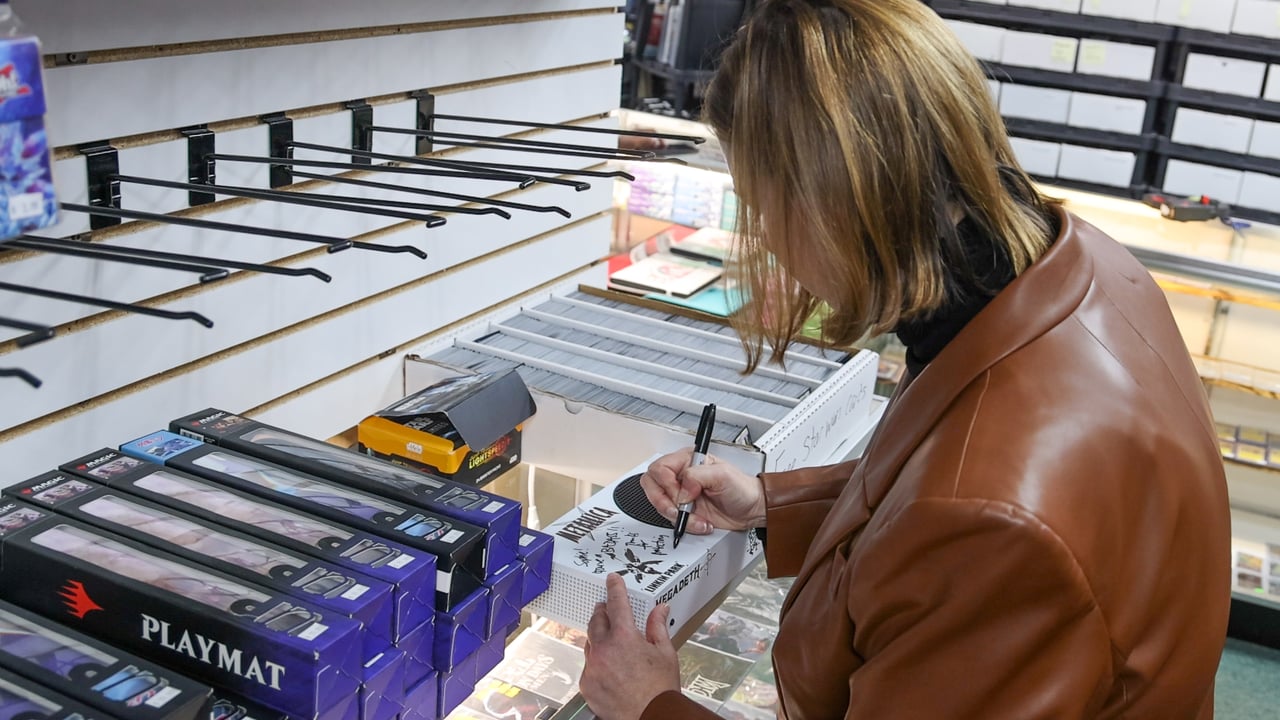You talk a little bit in the video you posted about how different video games are now versus when you were a kid. Do you have any gaming acumen?
I definitely don’t have gaming acumen, but as a child of the 80s and 90s, all my friends had an Atari. My dad was so cheap he wouldn’t buy us an Atari — he gave us a Texas Instruments console, which was all educational video games. That was horrible.
The local Dairy Queen in my town had the two-seater Ms. Pac-Man, and I was really good at that. Later on, I got a Nintendo — loved Super Mario, Tetris, all that kind of stuff.
But as I got older and did things like join the CIA, video games played less and less a role in my life. I have three brothers, and two of them still enjoy playing video games, and certainly my nephews and nieces are obsessed with video games, which is why they were so concerned about their own reputations when I said I was going to go and play Call of Duty. They were very worried that I was going to embarrass the family.
Call of Duty’s a bit of a trial by fire, as far as newer video games are concerned. There’s a lot of input.
There’s a lot going on. Video games have come a long way. Certainly, because I had carried a weapon in three tours in Iraq, I think the high schoolers who invited me thought that I’d be able to pick it up a little bit.
It was awesome. You hear me make fun of myself a little bit in the video — appropriately. I was a boat anchor on the rest of the team, that’s for sure.
Obviously, staying alive was holding a lot of your attention while you were in-game, but what was the conversation like with the kids? Did you talk about policy issues?
To be honest, the conversation was mostly just about what they spend their time doing, their normal scenario for playing, what’s going on in high school. One of them brought their mom — she was more of my generation, so that’s who I kept talking to about how games used to have two knobs and how they now have 78 buttons.
After we stopped playing, because I could not have a policy or politics conversation while I was trying to stay alive, we walked around the store … talking about the economy, what’s going on for the store and how they’re attracting customers.
But to be honest, I thought it was good just to have a night where we didn’t talk about politics. We really didn’t go deep on that, and I don’t think they wanted to. I think they just wanted to take a shot, invite me and bring me into their world for a few hours.
Of course, they were interested in what it’s like in the Senate versus what they see on TV, but for the most part it was them telling me about their lives — rather than them peppering me with questions about the Senate.
Maybe it’s because I’m from Michigan. We grew up where my dad was a lifelong Republican and my mom was a lifelong Democrat, and we never fought over politics, and we were never this polarized. It was never an issue of argument. We were much more likely to argue Michigan versus Michigan State than Democrat versus Republican.
We’ve got a lot of people in Michigan who can’t stand to talk politics, and that’s OK. You can be with your leader and not talk about politics at every moment of the day.
I was going to ask about using Call of Duty to connect with young people on policy, but I’m more interested in the idea that it wasn’t really about politics at all for you. Can you expand on that a bit more?
You’ve got to meet people where they are. These high schoolers invited me into their world, into something that I knew nothing about and wasn’t particularly good at. That is really different than having everyone come to you as an elected leader to talk about what you want to talk about.
I think Democrats in particular saw that that just didn’t work — that does not work.
For me, I said ‘hey, let’s be open to new things.’ We have a few other things planned where, again, local people invite me into their world, and I give up all my fancy titles, all my safe topics of conversation and I get to see what they care about and what they’re worried about. It’s been an important paradigm shift for me.
Do you think Democrats should do more of this kind of thing, and put themselves in situations where they are a bit outside their comfort zone?
I think that all leaders, Democrats and Republicans, could afford to get out of Washington — go into someone else’s space, feel a little uncomfortable, hear from people where they feel comfortable and get off our own turf a little bit.
Certainly Democrats need to do that, but I know plenty of Republicans here in the Senate who need to do the same thing.

Would you say that was your biggest takeaway from this experience? Beyond, of course, the fact that Call of Duty is hard, what did you learn?
Call of Duty is hard and humility is important. There’s lots of things that I’m bad at.
I think my key takeaway is just to get out of your comfort zone and be open to new experiences. I think that’s a good lesson for an elected leader. I also think it’s just a good lesson for a human being, especially from a state like Michigan, where we have so many different types of people and so many different perspectives. We’re a diverse state on many levels, and that’s a great thing but it also means you have to be willing to go and hear from a diverse group of people.
And maybe that means there’s more Call of Duty in your future.
I’m a cheap date. If you invite me and I can make it, I’m going to be there. I’m going where I’m invited to meet people where they are.
Subscribe to Closing Arguments
Sign up for new weekly newsletter Closing Arguments to get the latest about ongoing trials, major litigation and hot cases and rulings in courthouses around the U.S. and the world.





